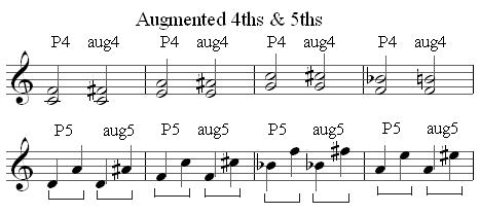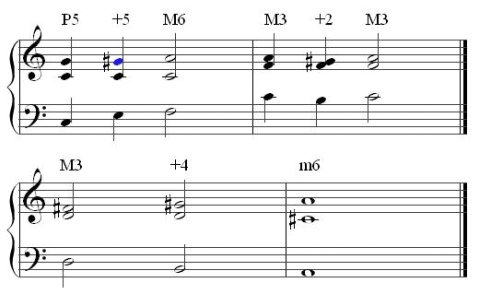Augmented Intervals
seconds - thirds - fourths & fifths - sixths - sevenths
Perfect Intervals - Augmented Intervals - Diminished Intervals
structure & function
AUGMENT - to add, increase - "to increase certain intervals by sharpening the higher note." (New Webster's Dictionary of the English Language)
The definition above says "certain intervals." To clarify this, PERFECT INTERVALS or MAJOR INTERVALS are the only ones that can become augmented. This happens when the top not is raised a half step, or semitone.
- C-G = P5 ..........C-G# = aug5
- F-Bb = P4 .........F-B = aug4
- Gb-Bb = M3 ......Gb-B = aug3
- Ab-Bb = M2 ..... Ab-B = aug2
Below are some examples of PERFECT intervals that have been AUGMENTED.

The examples above are either 4ths or 5ths. In each case the top note was raised a half-step without changing the letter name of the top note; i.e. C to F#, NOT C to Gb for an augmented 4th.
Below are some examples of MAJOR intervals that have been AUGMENTED.

Augmented intervals have an "active", "unsettled" sound - "active" in that they want to resolve to something more stable, or settled. For example the augmented 5th C - G# very naturally resolves to C - A (a major 6th)
Below are just a few examples of some standard, natural resolutions of several augmented intervals.

As you learn about chords, particularly chord progressions, you will begin to understand how harmony works. Certain sounds, intervals and chords naturally lead to, or resolve to other chords or resting points.


seconds - thirds - fourths & fifths - sixths - sevenths
Perfect Intervals - Augmented Intervals - Diminished Intervals
THE COMPLETE
ONLINE BUSINESS BUILDER
SBI
Hi and Welcome!
Fill out the form below to sign up for the free periodic
Player's Guide Newsletter!
Get tips and ideas about substitute chords, chord progressions and harmonic movement.
Lady Gaga Fugue
and
other Pop Classics!
Harmony and Theory:
by Carl Schroeder and Keith Wyatt





